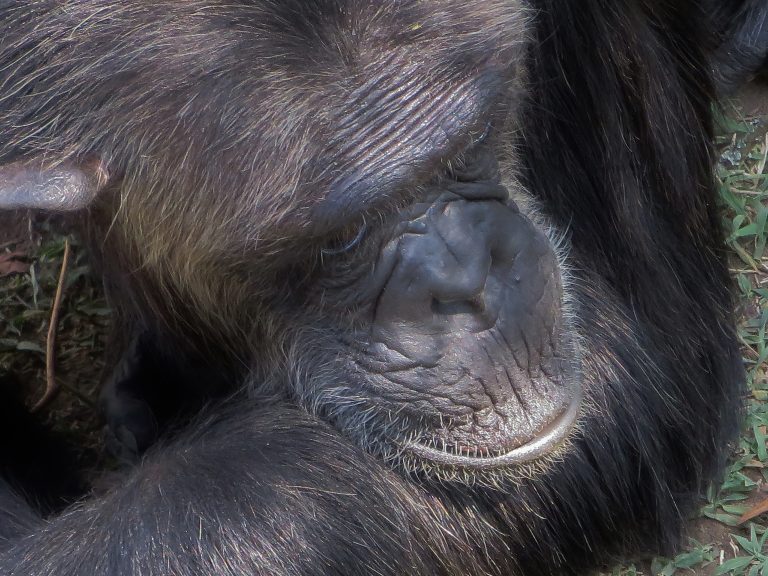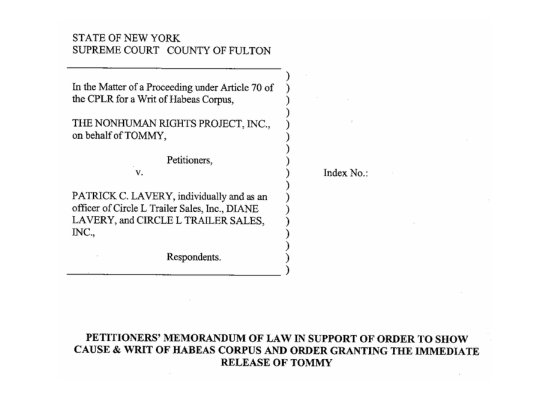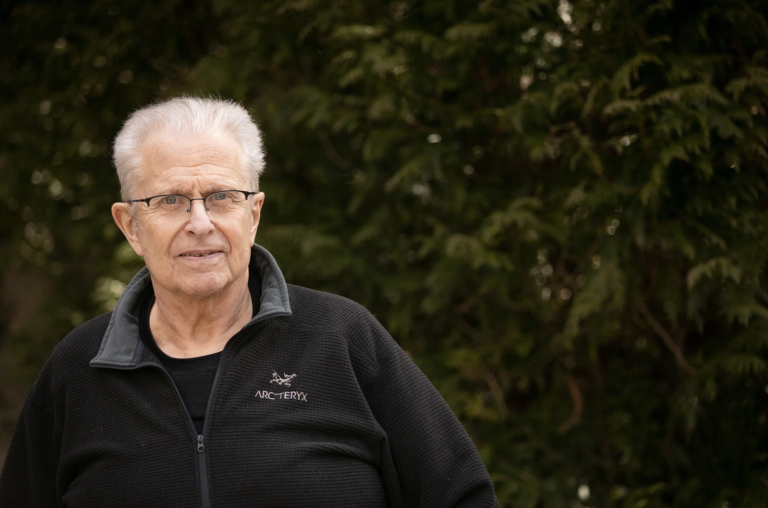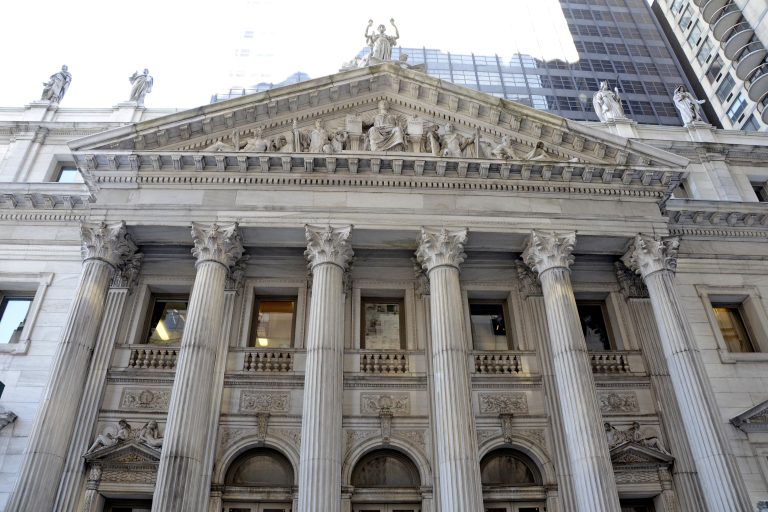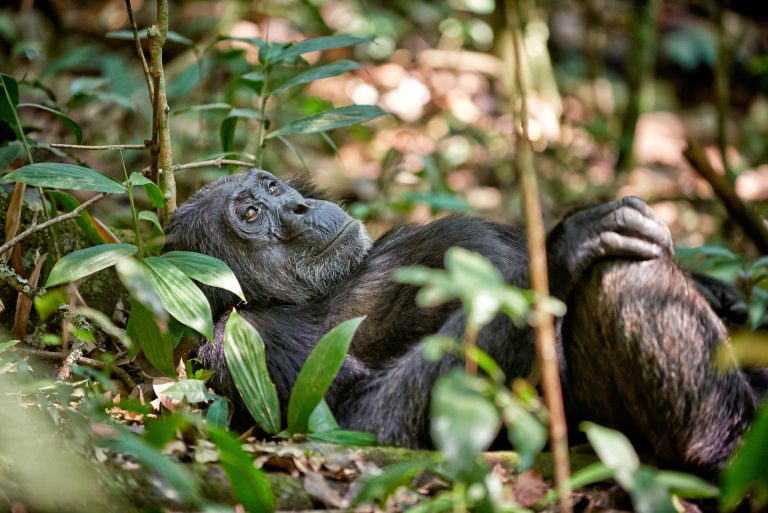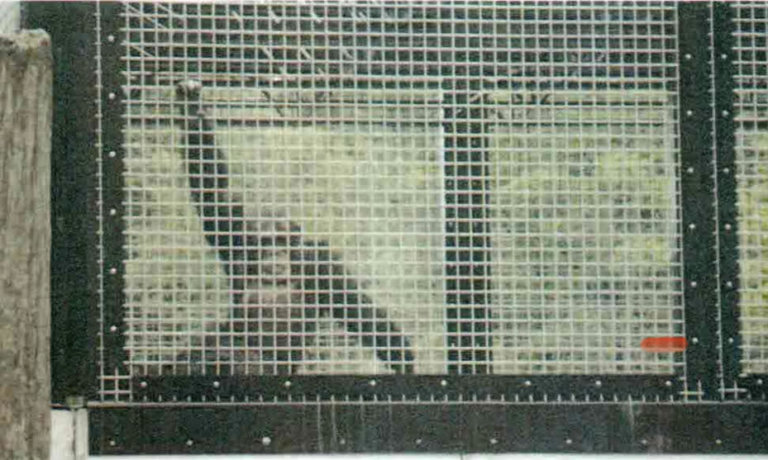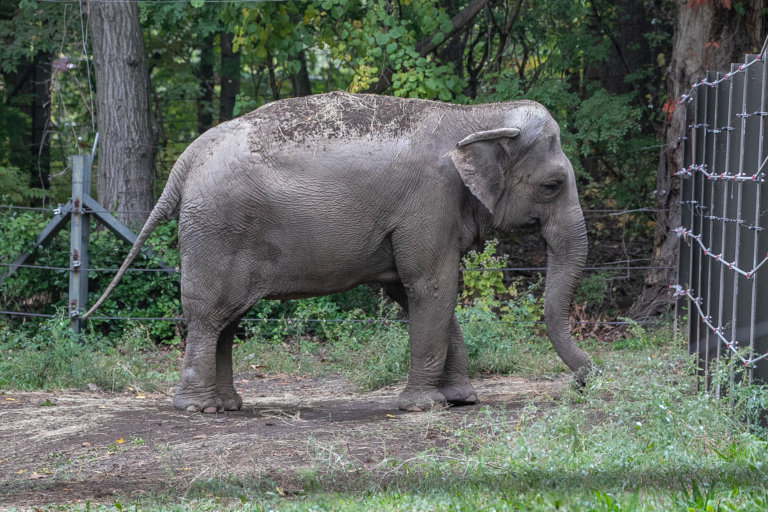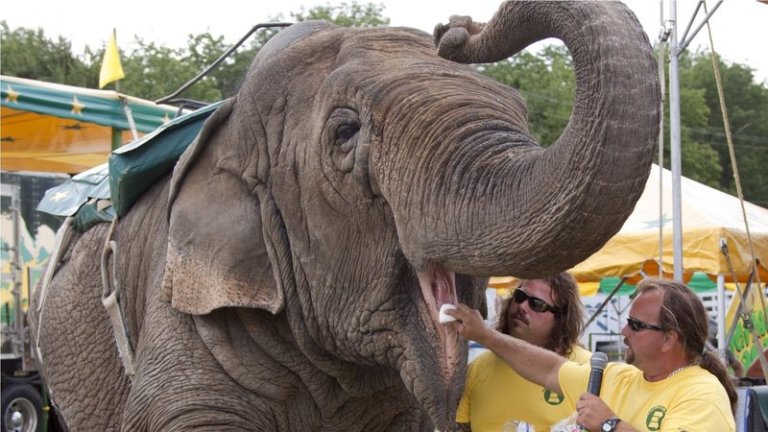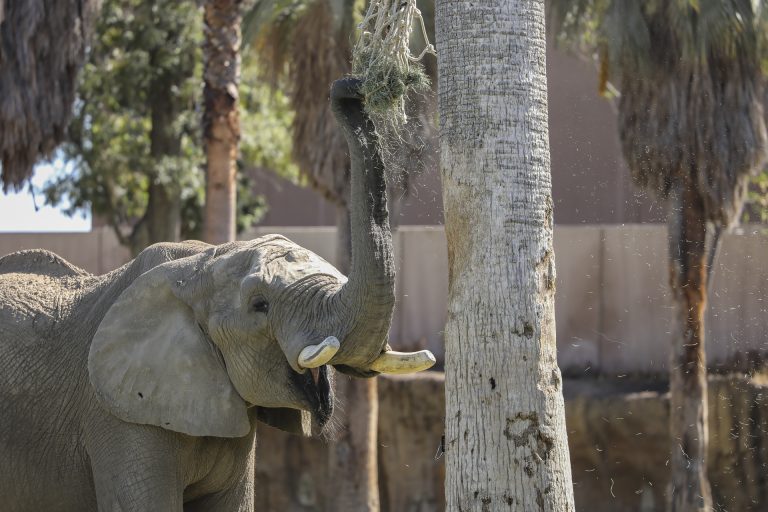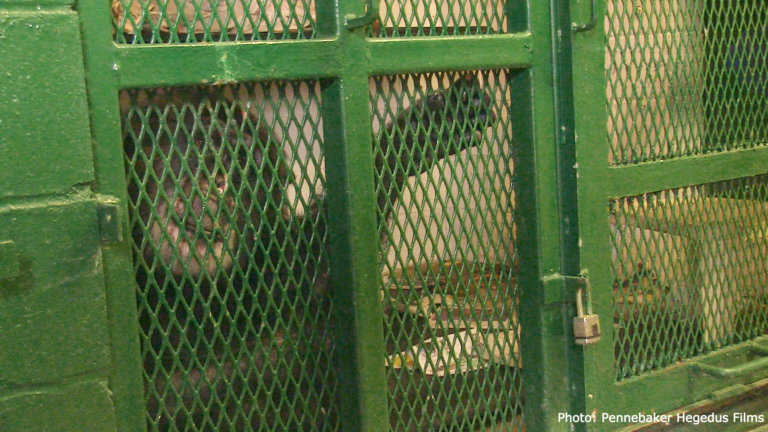
Tommy
When we found Tommy, a male chimpanzee, he was living alone in a cage in a shed on a used trailer lot along Route 30 in Gloversville, New York. Believed to have been born in the early 1980s, Tommy was raised from infancy by Dave Sabo, former proprietor of “Sabo’s Chimps.” Tommy appeared as “Goliath” in the 1987 film Project X, according to Sabo. Animal activist and TV icon Bob Barker and others alleged that trainers beat the chimpanzees used in the film with blackjacks and clubs. After Sabo died in 2008, “ownership” of at least some of the chimpanzees passed to the Laverys. The status of these other chimpanzees—including whether or not they’re still alive—is unknown.
Concrete walls painted to look like a jungle were the only intimation of a chimpanzee’s natural habitat in Tommy’s cage. A television was his only company. “He’d rather be by himself,” Patrick Lavery told the Albany Times Union in 2013. “He likes being by himself.”
Before our litigation concluded, media outlets began to report that Tommy had disappeared from Gloversville. His owner disingenuously claimed in interviews not to remember where he sent him, but private investigations conducted by the NhRP and federal and state records requests showed that Tommy had been moved out of state in 2015.
In 2022, we announced our belief that Tommy was imprisoned in a roadside zoo in Michigan called the DeYoung Family Zoo. As part of our efforts to secure his release to a sanctuary, over 3,000 NhRP supporters called on the Michigan Department of Agriculture & Rural Development (MDARD) to conduct an emergency inspection at the zoo. Behind the scenes, we were preparing new litigation on behalf of Tommy, whose right to liberty we had never given up on.
In December of 2023, in the midst of our final preparations for this case, we were devastated and outraged to learn Tommy had died. USDA records sent to us on Nov. 30, 2024 included an exchange between representatives from MDARD and the USDA in response to the emails NhRP supporters sent with their concerns about Tommy. The exchange suggests that Tommy died much as he had lived: alone, vulnerable, with no comfort but what he could offer himself. He had apparently been found dead in February of 2022, “curled up in his sleeping spot” inside a building on the DeYoung Family Zoo property, according to a USDA official.
Tommy’s death shows us how animal welfare fails nonhuman animals—everything that happened to him was legal.
The NhRP attorney who argued for Tommy’s freedom
Our founder and president appeared before numerous New York courts to demand recognition of Tommy’s legal personhood and right to liberty. Some of these courts were sympathetic; some were downright hostile. With his decades of experience, Steve was prepared for both.
Who's joined us in the fight
Scientific and legal support
Legal scholars Justin Marceau and Samuel R. Wiseman are among the many experts who submitted amicus curiae (“friend of the court”) briefs in support of the NhRP in Tommy’s case. In their brief, they urged the courts to allow Tommy to use habeas corpus to challenge the legality of his detention just as other “unjustly incarcerated beings” have done throughout history.
Donate to support the fight
Donate online
Mail a check
611 Pennsylvania Ave SE #345
Washington, DC 20003
Planned giving
Create a fundraiser
Highlights from the fight
Media coverage
A timeline of Tommy’s case

12.2.13
The NhRP files a petition for a common law writ of habeas corpus in New York State Supreme Court, Fulton County to demand recognition of Tommy’s right to liberty and release to a sanctuary. “No one has ever demanded a legal right for a nonhuman animal, until now,” says NhRP President Steven M. Wise of our first of its kind lawsuit, which is based on abundant, robust scientific evidence of chimpanzees’ self-awareness and autonomy. Read and download our Memorandum of Law; Exhibit A – Trust; and affidavits submitted by Steven M. Wise, Sarah Baeckler Davis, James R. Anderson, Christophe Boesch, Jennifer M.B. Fugate, Mary Lee Jensvold, James King, Tetsuro Matsuzawa, William C. McGrew, Mathias Osvath, and Emily Sue Savage-Rumbaugh.
12.3.13
Fulton County Supreme Court Justice Joseph M. Sise holds an hour-long hearing. At the end of the hearing, he offers his support for Tommy but denies our habeas petition:
“Your impassioned representations to the Court are quite impressive … I will be available as the judge for any other lawsuit to right any wrongs that are done to this chimpanzee because I understand what you’re saying. You make a very strong argument. However, I do not agree with the argument only insofar as Article 70 applies to chimpanzees. Good luck with your venture. I’m sorry I can’t sign the order, but I hope you continue. As an animal lover, I appreciate your work.”
1.10.14
The NhRP files a Notice of Appeal with the New York State Supreme Court, Appellate Division, Third Judicial Department.
3.14.14
The NhRP files an appellate brief arguing that the lower court erred in denying our habeas petition.
5.13.14
The NhRP renews our offer to settle the case and assist the Laverys in transferring Tommy to a NAPSA-approved sanctuary. We receive no response.
5.29.14
The NhRP seeks a preliminary injunction to prevent the Laverys from removing Tommy from New York State pending final appeals.
7.19.14
The Third Judicial Department grants the NhRP’s motion for a preliminary injunction. To obtain the injunction, we had to demonstrate that we were likely to prevail on the merits of the appeal and that there was danger we could suffer irreparable injury if the injunction wasn’t granted.
10.8.14
The Third Judicial Department hears oral argument in Tommy’s case. In an Albany courtroom packed with members of the media and supporters, a panel of five appellate judges questions NhRP President Steven M. Wise for twice the amount of time originally allotted for the hearing.
12.4.14
The Third Judicial Department rules that Tommy “is not a ‘person’ entitled to the rights and protections afforded by the writ of habeas corpus” primarily because, in the Court’s view, “unlike human beings, chimpanzees can’t bear any legal duties, submit to societal responsibilities, or be held legally accountable for their actions.”
12.17.14
The NhRP files a motion with the Third Judicial Department for permission to appeal to New York State’s highest court—the Court of Appeals—on the grounds that the Third Judicial Department made several significant errors of law in its 12.14.14 decision.
1.30.15
The Third Judicial Department denies our motion for leave to appeal.
2.23.15
The NhRP files a motion for leave to appeal to the Court of Appeals directly with the Court of Appeals.
5.8.15
Legal scholar Laurence H. Tribe, Carl M. Loeb University Professor and Professional of Constitutional Law at Harvard University, submits an amicus curiae brief in support of the NhRP’s motion, asserting that “the lower court fundamentally misunderstood the purpose of the common law writ of habeas corpus” and “reached its conclusion on the basis of a fundamentally flawed definition of legal personhood.”
5.28.15
The Center for Constitutional Rights—a leading legal advocacy organization on issues of civil liberties and human rights—submits an amicus curiae brief in support of the NhRP’s motion. CCR urges the Court of Appeals to hear Tommy’s case because it “agrees with the [NhRP] that [it] presents a novel question of significant importance, both in terms of the legal precedent it will set and as a matter of social justice and public policy.”
9.1.15
The Court of Appeals denies the NhRP’s motion. “While disappointed in the Court of Appeals’ decision today denying our motions for leave to further appeal in both Tommy’s and Kiko’s cases,” NhRP President Steven M. Wise says in a statement, “we are in no way discouraged.”
12.14.15
The NhRP files a new habeas petition on Tommy’s behalf with the New York State Supreme Court, New York County to again demand Tommy’s release from unlawful detention. Court filings include a revised Memorandum of Law and 60 additional pages of expert affidavits submitted by Jane Goodall, James R. Anderson, Christophe Boesch, Mary Lee Jensvold, William C. McGrew, and Sue Savage-Rumbaugh. Collectively, these documents demonstrate that chimpanzees can and do bear duties and responsibilities. At the same time, we maintain that the capacity to bear duties and responsibilities isn’t a prerequisite to legal personhood.
12.23.15
New York County Supreme Court Justice Barbara Jaffe denies the NhRP’s second habeas petition “to the extent that the courts in the Third Dept. [already] determined the legality of Tommy’s detention, an issue best addressed there, & [where the new petition is] absent any allegation or ground that is sufficiently distinct from those set forth in the first petition.”
10.28.16
The NhRP files an appeal with the New York Supreme Court, Appellate Division, First Judicial Department. Concerns that Tommy’s owner had moved him beyond the jurisdiction of New York courts delayed for months the filing of Tommy’s appeal. Read and download our Appellate Brief here.
10.29.16`
The New York Supreme Court, Appellate Division, First Judicial Department schedules oral argument in Tommy’s case.
12.5.16
Legal scholars Justin Marceau, Professor Of Constitutional and Criminal Law at University Of Denver Sturm College Of Law, and Samuel R. Wiseman, Professor of Constitutional and Criminal Law at Florida State University College Of Law, request leave to file an amicus curiae brief in support of the NhRP in Tommy’s case. In the brief, they exhort the Court to allow Tommy to use habeas corpus to challenge the legality of their detention just as other “unjustly incarcerated beings” have done throughout history. Of particular relevance, they note, is use of the writ by innocent human beings imprisoned for crimes they did not commit:
“Nonhuman animals are unquestionably innocent. Their confinement, at least in some cases, is uniquely depraved; and their cognitive functioning and their cognitive harm as a consequence of this imprisonment, is similar to that of human beings.”
12.7.16
Legal scholar Laurence H. Tribe requests leave to file an amicus curiae brief in support of the NhRP in Tommy’s case. In the brief, Tribe urges the court to consider Tommy’s case on the merits and “recognize that he is an autonomous being who is currently detained and who is therefore entitled to challenge the lawfulness of his detention by petitioning for the writ, even if that court ultimately concludes that [their] detention is lawful.”
The NhRP requests leave to file a reply to an amicus curiae brief filed 11.29.16 by Pepperdine University Law Professor Richard L. Cupp, Jr. with the First Judicial Department. Cupp “offers neither science nor law to support his positions” and reasons from a flawed understanding of the meaning of the social contract and how the common law evolves, the NhRP argues. Replies to amicus briefs aren’t common, and courts have ample latitude to ignore them, but we file one nevertheless because Cupp’s arguments far exceed the purpose of such a brief, in our view.
1.3.17
The First Judicial Department denies the NhRP leave to file a reply to Cupp’s brief and grants leave to Tribe and Marceau and Wiseman to file their amicus briefs.
2.15.17
The First Judicial Department schedules oral argument for 3.16.17.
3.16.17
In a joint hearing for Tommy and Kiko in Manhattan, NhRP President Steven M. Wise argues that the capacity to bear duties and responsibilities isn’t a legally acceptable reason for denying recognition of Tommy’s and Kiko’s legal personhood and fundamental right to bodily liberty. Requiring this capacity as a precondition for personhood “[would deprive] millions of humans in New York the ability to go into court” under habeas corpus, a reference to infants, children, incapacitated and elderly people who cannot realistically fulfill this requirement. Wise points out that chimpanzees can bear duties and responsibilities within their communities and says claiming otherwise is “biased and arbitrary.” The Third Department ruling was “irrational,” he tells the court, citing Tribe’s amicus brief. “It was unfair, and it’s not backed up by science.”
3.27.17
The NhRP delivers a letter to the First Judicial Department to notify the Court of 1) a recent ruling in Mohd. Salim v. State of Uttarakhand & Others that recognizes two rivers as legal persons with fundamental legal rights 2) the publication of a law review article that critiques the Third Judicial Department’s ruling in Tommy’s case and 3) a significant error in Black’s Law Dictionary regarding the definition of a legal person. According to the most recent edition of Black’s Law Dictionary, a “person” must have the capacity to bear “rights and duties.” However, the source on which the the definition is based actually states that “a person is any being whom the law recognizes as being capable of rights or duties.” The Third Judicial Department relied on the erroneous definition to deny personhood to Tommy the chimpanzee in 2014.
4.16.17
NhRP Executive Director Kevin Schneider emails the editor-in-chief of Black’s Law Dictionary, Bryan Garner, to notify him of the error and urge him to correct it. In an email sent in response, Garner thanks Schneider for drawing the error to his attention and writes that he has “marked it for correction in the [next] edition.”
4.11.17
The NhRP files a supplemental motion seeking leave from the First Judicial Department to file the NhRP’s letter and Garner’s reply for consideration in Tommy’s and Kiko’s cases.
6.6.17
6.18.17
6.22.17
The NhRP publishes a fully annotated version of the First Judicial Department’s decision, pointing out how and why it’s legally wrong.
11.16.17
The NhRP files a motion with the First Judicial Department for permission to appeal to New York’s highest court, the Court of Appeals, in Tommy’s and Kiko’s cases. Read the accompanying Memorandum of Law here.
1.18.18
The First Judicial Department denies our motion for permission to appeal. Within the next 30 days, the NhRP will file a motion for permission to appeal with the Court of Appeals itself, urging it to reject the First Judicial Department’s erroneous approach to our common law habeas corpus cases and to engage in the mature weighing of public policy and moral principle these novel and complex legal issues demand.
2.26.18
The NhRP announces it has filed a motion for permission to appeal to the New York Court of Appeals in Tommy’s and Kiko’s cases, and a group of prominent philosophers submit an amicus curiae brief in support. The NhRP argues in its Memorandum of Law that the First Judicial Department’s ruling requires review by the state’s highest court, not only because it conflicts with New York’s common law habeas corpus statute and previous rulings of the Court of Appeals, the First Department, and other Appellate Departments on issues pertaining to common law personhood and habeas corpus relief, but also “based on the novelty, difficulty, importance, and effect of the legal and public policy issues raised.”
3.8.18
The NhRP announces that legal advocacy organization the Center for Constitutional Rights and law professors Laurence H. Tribe, Justin Marceau, and Samuel R. Wiseman have submitted amicus curiae briefs in support of the NhRP’s motion for permission to appeal.
5.8.18
The New York Court of Appeals denies our motion for permission to appeal, and New York Court of Appeals Judge Eugene M. Fahey issues a concurring opinion in which he asserts that the failure of the Court to grapple with the issues the NhRP raises “amounts to a refusal to confront a manifest injustice … To treat a chimpanzee as if he or she had no right to liberty protected by habeas corpus is to regard the chimpanzee as entirely lacking independent worth, as a mere resource for human use, a thing the value of which consists exclusively in its usefulness to others. Instead, we should consider whether a chimpanzee is an individual with inherent value who has the right to be treated with respect.”
Judge Fahey concludes his opinion with a striking personal reflection: “In the interval since we first denied leave to the Nonhuman Rights Project, I have struggled with whether this was the right decision. Although I concur in the Court’s decision to deny leave to appeal now, I continue to question whether the Court was right to deny leave in the first instance. The issue whether a nonhuman animal has a fundamental right to liberty protected by the writ of habeas corpus is profound and far-reaching. It speaks to our relationship with all the life around us. Ultimately, we will not be able to ignore it. While it may be arguable that a chimpanzee is not a ‘person,’ there is no doubt that it is not merely a thing.”
Judge Fahey’s opinion is believed to be the first time a Court of Appeals judge has issued a separate opinion on a motion before the Court.
After the Court of Appeals declines to hear Tommy’s case, the NhRP focuses its efforts on demonstrating he was moved out of state and determining his exact location.
Amicus Support
